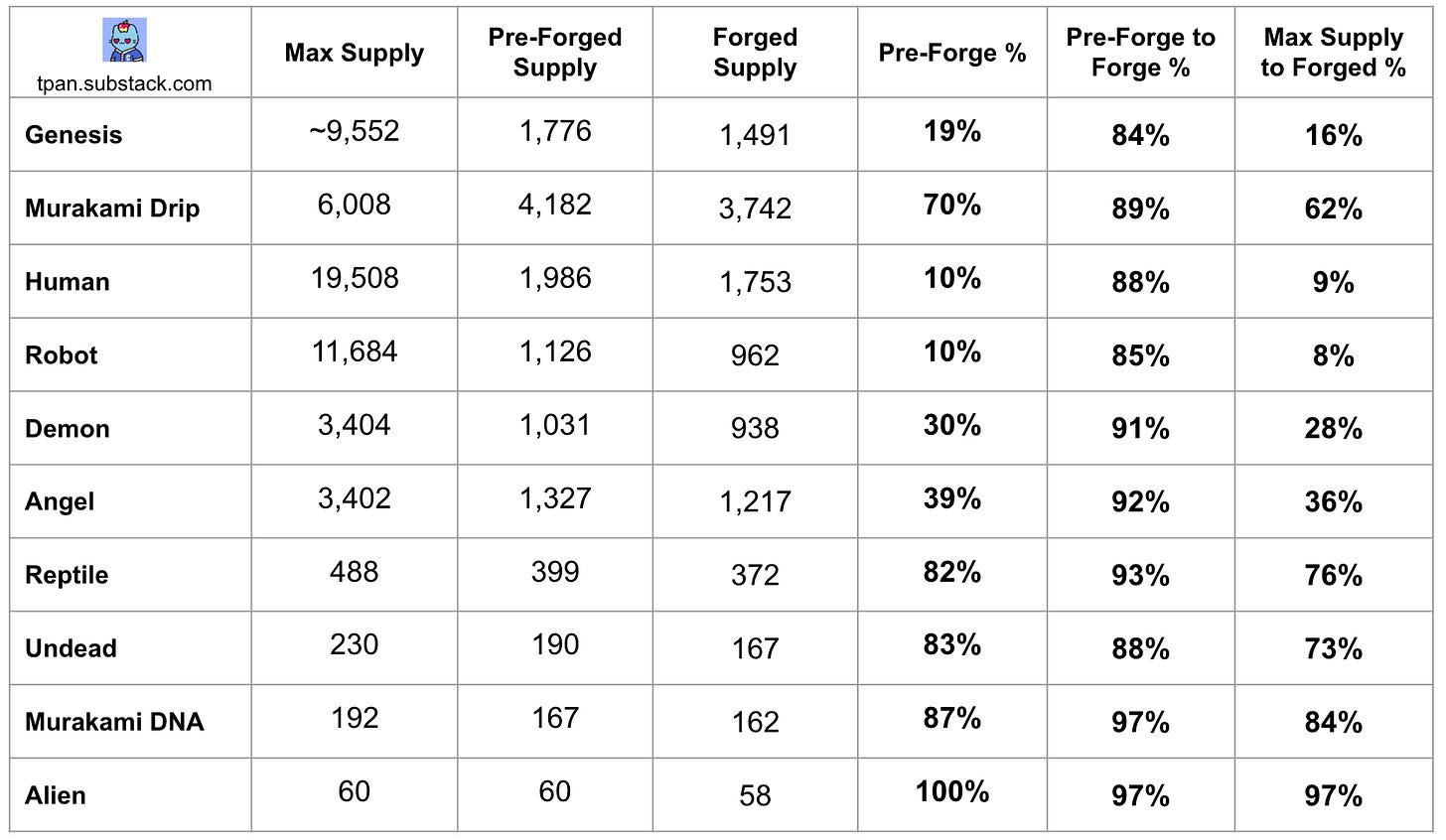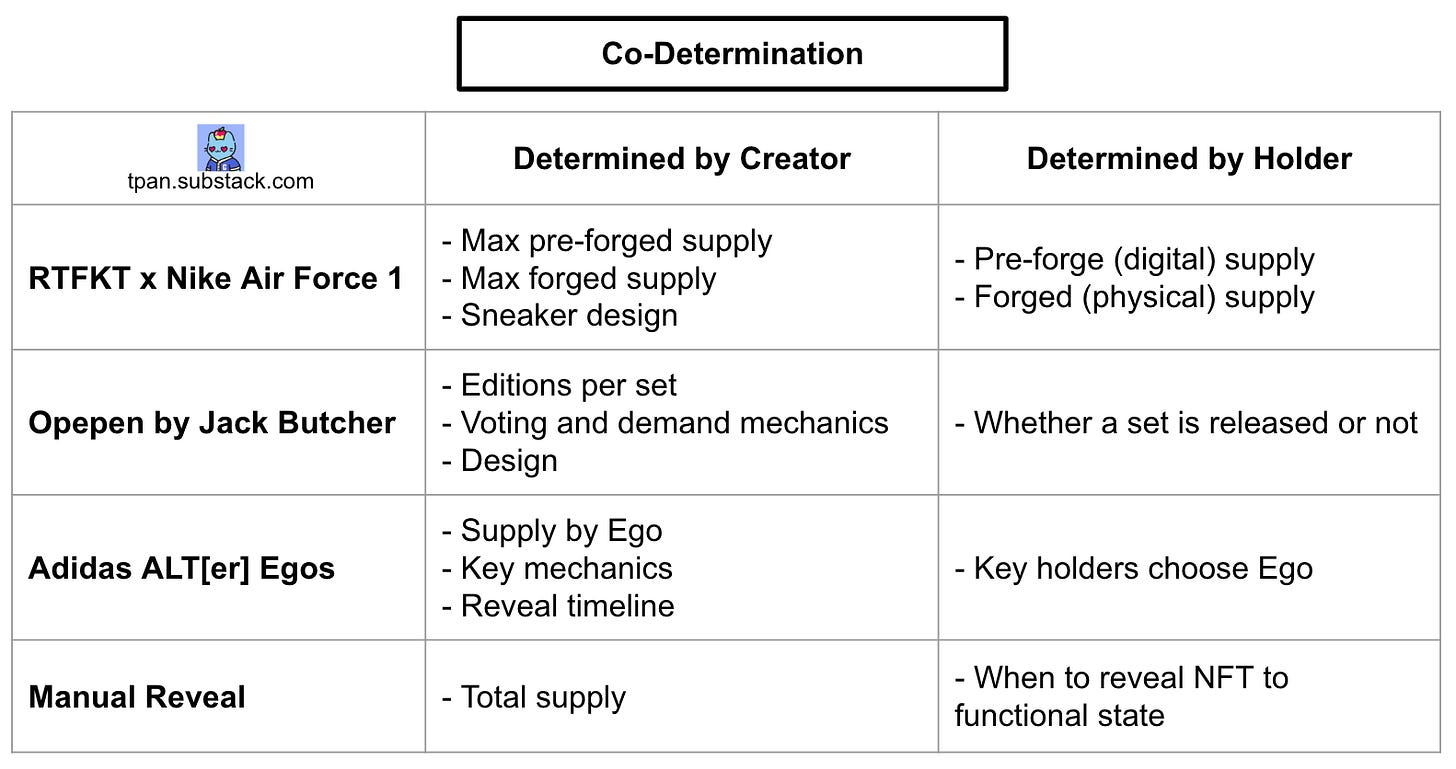Co-Determination vs. Co-Creation, IRL examples
In my last piece, I introduced the concept of Co-Determination, a process that serves as a form of decision-making and governance between a community and the creator.
I would describe co-determination as the younger sibling of co-creation.
Creation involves creating something - Whether it’s art, a NFT collection, or something else.
Determination involves filling in the details of the creation. Many parameters are set, while others are left to the community to decide.
What does IRL co-determination look like?
Restaurants: Let’s take our favorite fast casual burrito spot as an example, Chipotle. The options are plentiful, but the boundaries are set. We can choose the type of protein we want or decide if we want extra cheese. However, we can’t ask for a hot dog burrito because hot dogs aren’t an option.
Color Me Mine: This is a pottery studio that’s a great as a family activity, date, or form of stress relief. You choose a ceramic shape and can design it however you want. I would argue that there are aspects of co-creation as well as co-determination in this. The ceramic options are pre-set but what is created is up to the participant.
I wouldn’t be surprised if these concepts are used synonymously, but by splitting hairs, we can see that there are more options available to empower communities.
Which reminds me…
RTFKT x Nike Air Force 1: The Final Count
RTFKT’s sneaker forging event concluded yesterday. Forging rates on Tuesday:
If you don’t know what I’m talking about I recommend you read this first for context
And the final forging rates:
A healthy jump in forged sneakers before the deadline! Some observations with this data:
The theme around rarer sneakers = higher Pre-Forge and Forge rates persists
Aesthetic preference is largely determined at the Pre-Forge stage. This is because holders pay for the sneaker at this stage while forging only costs gas.
The forging deadline was extended by 3 hours, which may have helped procrastinators, especially those in non-US timezones.
There we have it, folks! The sneakers will be shipping out in October.
Other examples of Co-Determination
Thanks TPan. I still think you’re just making up this concept to sound smart. Is this a one-off?
Co-Determination may not be in the room with us, but it’s on the blockchain 😉
Opepen by Jack Butcher
Jack Butcher is famous for the Checks collection (Lucky Trader has a solid overview if you’re unfamiliar). Now that mechanics for Checks is in a self-sustaining state, Jack and his team are focusing on his second open edition collection: Opepen.
The collection metadata has been updated dozens of times, showing how the Opepen silhouette acts as a canvas for creativity. You can see numerous examples on the OpepenAI account, quite the inspiration.
A couple weeks ago, Jack announced the details about the Opepen metadata and reveal mechanics. TLDR:
Total collection size of Opepen is 16,000. These will be split in 200 sets, with 80 Opepen in each set.
In each set, there will be 80 editions
The editions are broken down into tiers of 1, 4, 5, 10, 20, and 40 for a total of 80
1 is a 1 of 1, 4 is an edition of 4, etc.
Each set has a different theme, with two released so far
In order for a set to be released, there is a voting mechanism from the Opepen holders
How does the voting mechanic work?
For a set to be approved, each edition tier needs to have at least 200% demand of the supply.
In Release 001, we can see that the demand significantly exceeds supply at every edition tier.
In a hypothetical scenario for Release 002, let’s say there were only 79 opt-ins for the forty edition tier. The demand would be 198% and the set would not be released, regardless of the demand from other tiers.
The actual demand was 760, which is 1900% demand, so this set was also released.
The proposed art and mechanics were set by Jack Butcher and his team. However, the community co-determines if the set is brought to life.
I can see this process taking years to complete (and likely never complete across all 16,000) as this is a massive coordination and governance exercise.
Adidas
The adidas ALT[er] Ego reveal process included a variation of co-determination as well. Weeks before the reveal, adidas shared more details about the utility and Ego distribution:
Normally, these Ego traits would be randomly distributed. However, adidas decided to add a ‘Key’ mechanic: If you ALT has a key (or if you purchase one), you can select your Ego prior to the reveal.
This allowed Key holders to reserve their desired Ego while determining the remaining supply that would be randomly allocated at the reveal date.
Manual Reveals
Most collections reveal in unison and the time of reveal is determined by the creator. However, some collections incorporate a ‘manual reveal’ mechanic where the holder determines when to reveal the NFT.
Some examples of manually revealed collections:
Bored Ape Chemistry Club (Serums) ➡️ Mutant Ape Yacht Club
Putting it all together
We can now see the different flavors of Co-Determination, and I’m sure I’ve left out some others.
Co-Creation is an ideal end state for creators and their respective communities. However, there may be operational, legal, or financial limitations to this.
Co-Determination allows for an alternative that is just as impactful in many situations.
Similar to the concept of decentralization, full decentralization might not be practical nor necessary in many cases. However, progressive decentralization or a centralization with decentralized pillars may be just as effective.
See you next week!

















I like this. Co-determination within the context of web3 sounds like something that should already be a phrase ;) (and now it is)!
Interesting & great research!